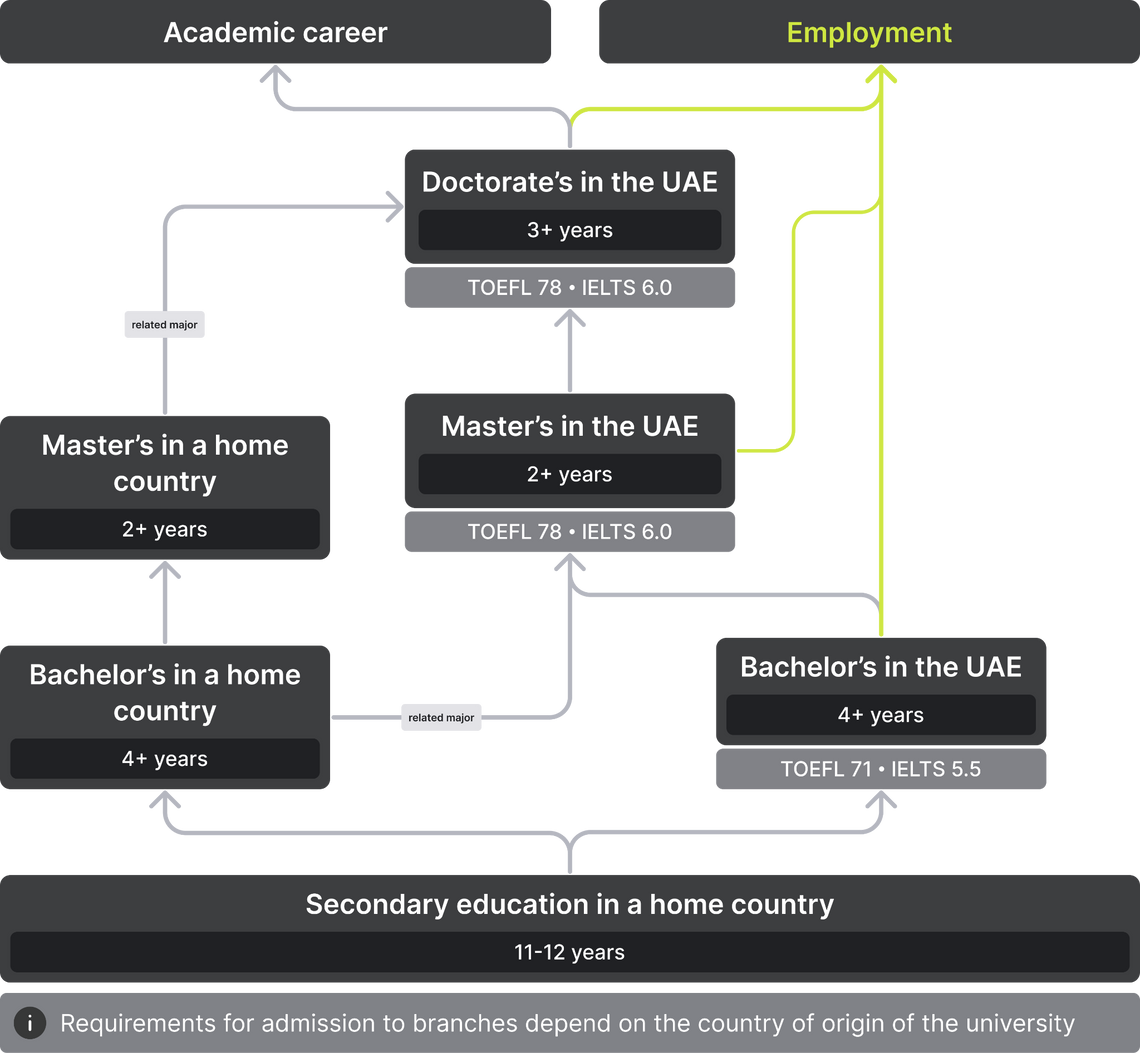Apply to a foreign university with confidence
- Properly fulfilled documents
- Perfect motivation letter
- Support from a personal mentor
- Offers from several universities
Discover the comprehensive requirements for admission to the UAE, including 11 years of education, language exam results, and the EmSAT test. Find out the full list of criteria in our detailed guide.
Free consultation




Applying to universities in the UAE offers international students not only access to a thriving economy and high-quality education but also the opportunity to benefit from generous university scholarships. These scholarships can potentially cover up to 100% of your tuition fees. National universities in the UAE admit students after 11 years of secondary education. However, be sure to double-check the admission requirements for branch campuses, as they can vary significantly depending on the regulations of the parent university's home country.
Learn more about higher education and universities in the UAE in our other articles.
| Program | Age | Duration | Min. cost / year | Avg. cost / year |
|---|---|---|---|---|
| Foundation | 17+ | 1-2 semesters | 8,170 USD | 10,893 USD |
| Bachelor's | 18+ | 4 years | 10,212 USD | 17,702 USD |
| Master's | 20+ | 2 years | 14,978 USD | 17,702 USD |
| MBA | 20+ | 2 years | 21,242 USD | 40,850 USD |
| PhD | 20+ | 3 years | 35,403 USD | 54,466 USD |
| Expense | Average cost |
|---|---|
| Language exam | 271 USD |
| Student visa | 545 USD |
| Application fee | 109 USD |
| Rent | 871 USD/month |
| Transportation | 29 USD/month |
| Food | 109 USD/month |
| Health insurance | 381 USD |
For exact costs, please refer to the official website of your chosen university.


Apart from the national universities, the UAE boasts over 30 branch campuses from countries such as the United States, Great Britain, France, Australia, and more. These campuses vary between local universities in terms of admission criteria, tuition fees, and rankings. Additionally, differences exist among the national universities themselves, which may play a role in your decision-making process. We'll delve into these distinctions in more detail.
Application requirements can vary significantly between universities, with even greater differences between national universities and foreign branches.
For instance, in American branch campuses, the requirements mirror those in the United States, where 11 years of schooling are sufficient for enrollment. On the other hand, in British branch campuses like Middlesex University Dubai, prospective students may need to complete a foundation year or have completed their school education with A-level qualifications before pursuing a bachelor's degree.
Most universities, including national ones, conduct their instruction in English. However, the Sorbonne branch requires proficiency in French. While there are universities that offer courses in Arabic, they typically see very few international students. Additionally, these universities often maintain a gender divide, with institutions like Zayed University being exclusively for women, where the foreign students constitute just 2%[1].
Arab universities do not typically hold top positions in global rankings, with only three institutions — Khalifa University, United Arab Emirates University, and the American University of Sharjah — making it into the world's top 500. Hence, if the reputation and prestige of a university is important to you, it may be wise to consider branch campuses. For instance, in the QS ranking, New York University is placed 43rd globally[2], while the University of Birmingham ranks 80th.
However, remember to take subject-specific rankings into account. Even if a university doesn't rank highly overall, it might excel in your particular field of interest. For example, while Khalifa University is 202nd in global rankings, it holds the 20th position in the field of "Oil and Gas Business"[3].
More about international rankings
Tuition fees at UAE universities can vary significantly. For instance, at the American branch of New York University Abu Dhabi, the annual tuition cost is approximately 55,500 USD[4]. In contrast, at the University of Birmingham Dubai, you can expect to pay around 40,850 USD per year. Meanwhile, at the national American University of Sharjah, the average annual tuition fee is approximately 27,233 USD.
Studying in the UAE can be a significant financial commitment. Nevertheless, nearly every university in the country provides generous scholarship opportunities. When making your choice, consider the size and eligibility criteria of the scholarships available. For instance, at the United Arab Emirates University, you could secure full tuition coverage if you meet all the requirements. Meanwhile, at the University of Wollongong in Dubai, the maximum discount offered through scholarships is typically 50%.
UniPage has a longstanding partnership with universities in the UAE. We provide full support in university and program selection, tailoring our advice to align with the abilities and interests of our clients. With our extensive knowledge of international education, we leave no detail overlooked during the document preparation process and when crafting motivation letters.
Items 1-6 of 95
Advanced search

Application requirements can vary significantly from one university to another.
For admission to national universities, you will typically need a certificate of equivalence from the UAE Ministry of Education. This certificate verifies that your educational level corresponds to that of the Emirates.
National universities may also require results from local standardized tests like the EmSAT in specific subjects. For example, if you wish to pursue engineering at the American University of Sharjah, you will likely need to take the EmSAT in mathematics and physics[5].
Arabic proficiency is not a prerequisite for studying in the UAE, since the primary language of instruction at universities is English. Moreover, English proficiency requirements are generally modest, usually starting at the B1 level. Universities typically accept the following English language exams:
In some cases, the university itself may administer an English entrance exam. If you prefer to study in Arabic, you may need to take the EmSAT Arabic test.
The application process for UAE universities is decentralized. Applicants need to complete a form on the website of their chosen university and attach scans of their diplomas, language proficiency certificates, EmSAT results, passport copies, and other required documents. Admissions decisions can be direct or conditional based on the results of language and standardized tests, as well as academic performance. It's advisable to maintain a GPA of at least 4.0 out of 5.0. If you receive a conditional acceptance letter, you may be required to take entrance exams or language courses at the university.
Branch campuses do not typically require the EmSAT exam or a certificate of equivalence, as they follow the admission criteria of their respective home countries.
For instance, admission to American branch campuses mirrors the requirements in the United States. Students can enroll after completing 11 years of schooling and may need to take standardized tests like the SAT or ACT[6]. Meanwhile, British branch campuses often require students to complete a Foundation program at the university or have graduated with A-level qualifications[7].
In addition to these requirements, national universities and branch campuses may also request the following documents for master's and PhD programs:
All documents and their copies should be translated into English and/or Arabic and notarized. Specific transfer requirements should be clarified with the respective university.
Universities in the UAE have two application periods for both the autumn and spring semesters. Moreover, some universities offer two types of application deadlines: an "early bird" option for those who apply early, and a general deadline for regular applications.
| University | Bachelor's programs | Master's programs | PhD programs | |||
|---|---|---|---|---|---|---|
| Autumn | Spring | Autumn | Spring | Autumn | Spring | |
| American University of Sharjah | July 20, 2023 | December 22, 2022 | July 20, 2023 | December 22, 2022 | July 20, 2023 | - |
| Canadian University of Dubai | July 2023 | December 9, 2022 | July 2023 | December 9, 2022 | - | - |
| New York University Abu Dhabi | November 1 / 5 January | November 1 / 5 January | - | - | ||
If you plan to study or work in the UAE, ensure that all your educational documents undergo consular legalization. This process can take up to 3 months, as it includes several stages:
Please note that successful completion of all stages is necessary to receive final approval from the consulate. Keep in mind that your grade transcript must also undergo legalization.
Some universities or employers may require additional confirmation of document equivalence from the UAE Ministry of Education, which involves obtaining a certificate of equivalence. This can easily be done online through the department's website, with the cost ranging from 50 to 54 USD per document, depending on the level of education.

Some national universities, such as the United Arab Emirates University, provide high school graduates with the opportunity to enroll in one-year Foundation programs designed to prepare them for university admission.
To be eligible for these programs, applicants need to pass:
Even though the secondary education system in the UAE spans 12 years, students entering university after completing the 11th grade are usually not required to undergo a preparatory program.
In some branches of foreign universities, such as the University of Birmingham Dubai[8] or Middlesex University Dubai[9], a Foundation program is a mandatory requirement for 11th-grade graduates. You may also be eligible for admission to the first year of a bachelor's degree program after completing one year at a university in your home country.
To be eligible for a preparatory program, you need to meet specific criteria, including a high GPA of 4.0 out of 5.0 and a certificate demonstrating English proficiency: IELTS scores ranging from 5.5 to 6.0.
If you have completed one of the international school programs, such as A-levels, you may also have a pathway to directly enter the first year of a bachelor's degree program.

Each university in the UAE establishes its own admission requirements for bachelor's programs. As a general guideline, a strong academic record with a GPA of 4.0 out of 5.0 and a language proficiency certificate are often sufficient for admission.
Furthermore, universities may request a certificate of equivalence from the UAE Ministry of Education, which validates that your educational level aligns with standards in the Emirates.
If you meet the criteria, you will be required to take the local standardized EmSAT test. The specific content of the exam depends on the program you are applying for. For instance, to enroll in an architecture program, you may need to complete mathematics and physics portions of the EmSAT.
The application process involves submitting your application through the university's website and attaching all the required documents. After a review, the university will issue a letter of acceptance or conditional acceptance. Conditional admission may be granted if your language proficiency or EmSAT scores do not meet the minimum requirements. In such cases, you may either be directed to language courses at the university or to take entrance exams, which are commonly referred to as placement tests[10].
Branch campuses in the UAE typically align their admission requirements with those of their parent universities. As a result, applicants seeking admission to British, American, Australian, and other foreign branches often do not require a certificate of equivalence.
However, you may not be eligible for direct admission to British or Australian branch campuses after completing the 11th grade. In such cases, you may be required to complete one year of bachelor's studies in your home country, pursue one of the international school programs like A-levels, or undergo a Foundation program at the university[11].
For American branch campuses, you can often gain admission immediately after completing the 11th grade. However, you will need to take standardized tests like the SAT or ACT.

For admission to a master's program, you must hold a bachelor's degree from an accredited university with an average GPA of at least 3.0 out of 4.0.
Ensure that your bachelor's diploma is recognized by the UAE Ministry of Education to obtain a certificate of equivalence. Submit this certificate and other required documents on the website of your chosen university.
A minimum English proficiency at the B2 level is required. Confirm it by presenting an IELTS (6.5), TOEFL iBT (80), or EmSAT English (1550) certificate.
You can obtain a UAE MBA at national universities and branches of other universities. According to Forbes Middle East, American University of Sharjah, Canadian University of Dubai and American University in Dubai[12] are top-ranking for MBA. There are also specialized business schools to consider.
Admission requirements:

You will require a master's degree to apply for a PhD. If you are applying to study at a national university and received your previous education outside of the UAE, you will also require a certificate of equivalency, which is a document that confirms that your degree meets the country's standard. It must be requested from the UAE Ministry of Education. A transcript with grades must be attached to the diploma with the average score of at least 3.0 out of 4.0.
Some universities, such as United Arab Emirates University, require at least 3 years of experience in a relevant field[13].
Applicants submit an application on the university website together with the required documents.

Higher education in the United Arab Emirates requires payment and is relatively expensive. The majority of universities provide support to its students by providing various scholarships and tuition discounts. Occasionally, the scholarship can cover up to 100% of education, but more often it covers 30-50%.
Applications for scholarships are usually accepted during the admission period. The main criteria for granting the scholarship are high grades and IELTS results above 6.5.
In the case of a student receiving a scholarship, at the end of each academic year the administration will evaluate the student's academic and extracurricular performance to decide whether to continue funding. Thus, the scholarship can be received during the studies by achieving excellent results in a given semester.
Active members of university sports teams and applicants who submitted documents before anyone else can receive early bird admission discounts. UAE universities also feature "family grants" provided to siblings or other close relatives who study at the same university at the same time. In this case, each family member receives a discount.

To study at a UAE university you will require a national student visa. After admission, the student fills out a visa application on the university website together with attaching the required documents. The educational institution acts as a visa sponsor, which is why it is not possible to apply for a visa at the consulate on your own.
The visa application must be submitted not earlier than 60 days before the start of classes. Processing usually takes 2-5 weeks.
The visa fee depends on the university. For example, The British University in Dubai charges 1,362 USD[14], while Heriot Watt University Dubai charges 821 USD[15]. If you are already in the UAE on another visa, the national visa charge will double.
You also have to pay a deposit of about 953 USD. It will be returned to you at the end of the education period.
Required documents:
A student visa is valid for 1 year, then it must be extended (no fee is required this time). Starting from November 2018, outstanding students can receive a Golden Visa for 5 years[16].
Upon arrival you will have to obtain a temporary Emirates ID. You can register for the document online on the Federal Authority for Identity and Citizenship (FAIC) website.
60+ countries
we work with
$1,000,000 saved
by students through scholarships
6,400 offers
our students got